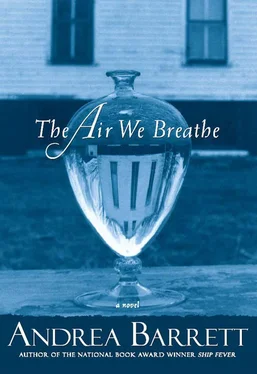Finally Miles stopped, at a few minutes after six, making us late for dinner. We were split up differently then, the women and the men in separate wings, the dining hall among the few places where we met. Even there, a wide corridor patrolled by two attendants separated our territories. No talking was allowed across that borderland, no joking, no flirting, no winking nor passing of notes. Soon Miles would learn to capitalize on this separation, but that night our group still consisted only of men, arguing among ourselves about the afternoon’s session.
By the time we reached the dining hall, half of us had already decided we wouldn’t attend again. This Miles person, someone said — who was he? A bored boss with too much time on his hands. Someone else, annoyed by the clicking sound of Miles’s fancy shoes on the wooden floor, agreed. But Leo and Ephraim and several others said we should give Miles another chance; parts of the talk had been interesting, and it was a break from our routine. How many of those did we get?
Still arguing, we entered through the big double doors, each pinned for an instant by the gaze of everyone else. We had tables for six, then, ranged in even rows on either side of a central passage, and that made it easy to see at a glance how many were present; the dining room attendants used to count us at each meal. Ephraim entered the room last, pushing Leo’s chair. And Leo — this was his first public appearance, except for the meeting — looked calmly around and waved, which made some of us laugh.
Ephraim wheeled him to Hiram’s old place and then went to the food line. Alone at the table, Leo studied the room. Clarice, who was serving that night, brought Leo a plate: a privilege that came with the wheelchair. Stewed chicken, egg noodles in gravy, applesauce, string beans, a biscuit with butter. When Ephraim sat down with his own full plate, he saw that Leo was picking at his. “You know you have to finish that,” Ephraim said.
“She brought me too much,” Leo complained.
“It’s the standard portion,” Ephraim said. He pointed to the sugar bowl, where the Daily Thought was propped. Leo read from the pink rectangle: Food is life. Eat three times as much as you think you need: once for the fever, once for the germs, and the final time for yourself.
“I thought once I got out of the infirmary I’d be done with some of these rules,” Leo said.
“Actually there are more rules here,” said Ephraim, “but they aren’t written down. We’re expected to pick them up from each other, to regulate ourselves.”
“Aren’t we fortunate,” Leo said, which made Ephraim laugh out loud.
APIPE BROKE THAT afternoon in the village, leaving all the houses on the street below it temporarily without water. Despite Mrs. Martin’s apologies, Miles, who’d been looking forward to his evening bath, felt unreasonably annoyed. In place of his excellent porcelain-lined tub, his robe warming by the radiator as he soaked, he had only the familiar curves of his cure chair, a book he’d ordered with great excitement but had since lost interest in, and the glow of a lamp that, as good as it was for reading, made invisible all that his porch screens normally revealed. Beyond its circumference stars, trees, rooftops vanished, people vanished along with their dogs, leaving him cut off from the outside world and yet completely exposed. From the street, he knew, the porches dotted the sky like movie screens, revealing every action. He crossed his eyes and waggled his fingers by his ears; let anyone walking by Mrs. Martin’s house, and rude enough to look, see that. Behind the porch — men were working invisibly, still trying to fix that broken pipe — a tool clanged against the buried iron.
How did they work in the dark? Headlamps, perhaps, or miner’s lanterns shining down on the water where it gushed. In the same way he’d meant to illuminate for us, earlier, the excitement that for almost thirty years had shaped his life. On his best days he still felt it: the pure delight that had swept him when, as a boy of eight, his friend Edward Hazelius had shown him a magazine article about a vanished world. Text running in double columns with colored illustrations: the artist had depicted an inland sea, covering what was presently Kansas and swarming with paddle-finned plesiosaurs, gigantic turtles, mosasaurs, and giant clams. Above the water, pterodactyls flapped while the horned Monoclonius lumbered on the shore. New creatures, he read with wonder, were being discovered every month, altering our ideas about the history of the earth. Instantly, he and Edward had seen their path.
For years after that, Miles had walked daily from his own family’s stone mansion to the peculiar concrete home designed by Edward’s father and built with cement from Miles’s father’s plant. The Hazelius house boasted rooms shaped like wedges of pie, others shaped like pillows or teepees, all of them studded with the colorful tiles that Edward’s father had brought back from different parts of the world or manufactured in the tile works behind the house. The library was filled with natural history books and magazines, and near the fireplace, which was framed by tiles depicting the branches of knowledge, the boys devoured everything they could find. Edward’s father ordered books for them, while his ancient great-aunt Grace, who lived in a separate wing of the house, fanned their interests. Although she seemed to Miles like a dinosaur herself, wrinkled and knobbed, she’d traveled in the Dakota Badlands long ago, excavating fossils with the help of her sister and accumulating the treasures now filling her rooms. The teeth of saber-toothed cats, the jaws of a primitive camel; where, Miles wanted to know, had she found these things? Neither he nor Edward knew sign language and she was deaf, so they wrote out their questions. She answered in a precise and tiny script, revealing secrets so interesting that the boys imagined lives spent hunting fossils.
Perhaps this was more appealing because they knew what really lay before them — both were only sons, the cement plant waiting for Miles as the tile works would fall to Edward. In college they dutifully studied the chemistry, physics, and engineering their futures would demand, but they also went to geology and paleontology lectures and read surreptitiously. During the summers they made field trips, camping out in Kansas or Nebraska and walking formations each day. Sun, sky, powdery earth, the feel of fossil bone and the sound of Edward’s piercing whistle when, from an adjacent ridge, he signaled a find: the trips jumbled in Miles’s mind but specific moments were captured whole, as if they’d tumbled intact into the tar pit of his memory.
How hard it had been to leave those trips behind! During their junior year, Edward met a girl named Chloe in the fall and married her — recklessly, Miles judged; she was seventeen — in the spring. That summer Miles went to Wyoming alone, but once he graduated and returned to work at his father’s plant, he too stopped traveling. Still Edward was only a few minutes’ walk away, settled into the mazelike house with Chloe and their new baby, Lawrence, and although both men were busy they met almost daily to trade news from the bone-hunters’ world.
Throughout their twenties they’d continued to share books and conversations. Chloe usually went her own way when they gathered; even after Lawrence’s birth she wore surprising clothes and continued to act, in Miles’s opinion, like a girl. She showed no interest in the family business, which expanded under Edward’s direction into the manufacture of ceramic materials used in ships and automobiles. When their second son, Charles, was born, Miles bought a crib worthy of one of the heirs to such a firm. Chloe took both the crib and Charles with her when she ran away.
Читать дальше












